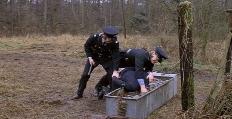|
|
Stanley Kubrick's a Clockwork Orange deals with violence as a cyclic force affecting and changing almost anyone who becomes
affected by it. Violence is a part of human nature and is natural for Alex, as his actions are spontaneous and instinctual based on
his emotions and desires, rather than reason or rationalism. Much of the time, disgust and horror are held against his actions by
the viewer. Ironically, Kubrick develops a transformation that makes the viewer sympathize with Alex after his experience with
the victims he scarred before the Ludwig technique. The role Karma plays is cyclic, such that the reversal of perpetrator and
victim is reversed, and none only by an authoritative figure. To destroy freedom, still requires violence, whether physically from
abuse, or mentally, torture causes madness to develop creating a change of Alex's character.
Much of the world creates a sense that everyone is mad or eventually becomes mad through trauma, conflict, struggle or other
interests, and that without an understanding or consciousness of the act, its entertaining.
|
|
|
|
 |
|
 |
|
|
|
|
|
Violence exists for Alex in order to cope with
the society he is brought up in and his
disconnection with it. For those he victimized, it
leads them to experience a self gratifying,
healing power from any humility endured from
previous events by Alex's hand.
|
|
|
|
|
|